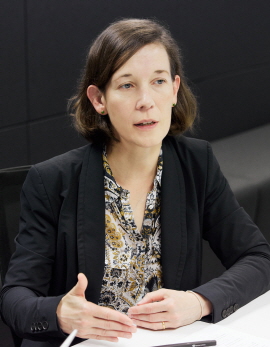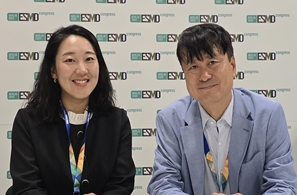- "High hopes for reimbursed Ilaris…a new treatment option"
- by Whang, byung-woo | translator Hong, Ji Yeon | Feb 5, 2025 05:52am
Clinical practices have high hopes for changes to the treatment setting as Ilaris (canakinumab), a treatment for Hereditary Periodic Fever (HPF) syndromes, passed the reimbursement hurdle nine years after approval.
Although doctors still face difficulties finding the appropriate dosage, analysis suggests that reimbursement will solve unmet needs for ultra-rare disease treatment where treatment options have been limited.
Experts believe that systematic improvements are needed to overcome the limitations, such as genetic testing, in the long term.

The HPF syndromes are rare autoinflammatory diseases that occur shortly after birth or in childhood. Unexplained and periodic episodes of full body fever and rashes characterize these diseases.
The HPF syndromes are categorized into various disorders based on abnormal genes. Symptoms such as fever and rashes most commonly occur, but other symptoms vary by disorder.
"In my opinion, it is more suitable to call this disorder periodic fever syndromes (PFS) rather than the HPF syndromes," Dr. Lee said. "In contrast to other autoimmune diseases, these disorders are categorized as autoinflammatory disorders. A single gene causes some of these disorders, whereas several genes are indicated to contribute to the disorder," Dr. Lee explained.
In South Korea, common cases include Cryopyrin-Associated Periodic Syndrome (CAPS), Familial Mediterranean Fever (FMF), Tumor Necrosis Factor Receptor-Associated Periodic Syndrome (TRAPS), and Hyper IgD Syndrome (HIDS). These disorders are all single-gene disorders.
According to Dr. Lee, the most common treatments for these disorders include nonsteroidal anti-inflammatory drugs (NSAIDs) and steroids to alleviate pain and fever.
"In 2010, the introduction of the IL-1 inhibitor Anakinra allowed for the replacement of steroids, enabling most patients to discontinue unnecessary medications. However, since the injection had to be administered daily at a fixed time, patients faced significant challenges," Dr. Lee remarked.
"Typically, the dosage of the medication must be increased depending on the severity of the disease/ Because of the limitation of dosage that can be administered at a single injection, patients often suffer serious pain, and the other problem is that the required dosage required two separate injections," Dr. Lee stated.
In other words, Dr. Lee says that existing treatments had limitations in terms of long-term effects and patient quality of life despite the nature of HPF syndromes in affecting various aspects, such as patient's growth and development, psychological elements, and causing fever and pain.
"Reimbursed Ilaris provides benefits in terms of treatment effects‧administration interval"
Changes to the treatment setting have been apparent since August of last year, following reimbursement coverage of Ilaris for CAPS, TRAPS, and FMF."
What changes have been made to the treatment setting with reimbursed Ilaris? Dr. Lee says only few cases can be compared because it is a rare disease, but reimbursed Ilaris provided significant benefits in symptom improvements and improved patient quality of life.
"As patients switch to Ilaris based on insurance criteria, there have been no cases where patients gave up treatment despite the process being tough finding the appropriate dosage after starting with a low dosage," Dr. Lee said. "Since the administration interval is longer than the other treatments, patients can now be treated with more freedom."
"Additionally, patients can get injections at the hospital, so they are now freed from the burden of being injected at home by non-experts," Dr. Lee added. "The half-life of Ilaris is about 26 days, which minimizes the burden of drug administration time. Consequently, Ilaris provides a crucial turning point for patients."
While reimbursed Ilaris provides various benefits, the remaining issues are the dosage and managing side effects due to the longer administration interval.
Depending on the type of HPF syndromes, Ilrais is given every 8 weeks or 4 weeks. Doctors are concerned about dosage adjustment or symptom management if symptoms occur during treatment.
"The process of determining the appropriate dosage was not easy, but all five patients currently undergoing treatment have found their optimal dose and are continuing treatment stably," Dr. Lee said. "Although it has been just over four months since starting Ilaris, we now have more flexibility in adjusting the dosage for the next cycle while closely monitoring weight gain and symptoms."
Adjusting treatment dosage remains a challenge…"We must consider a patient-customized treatment"
Yet, another challenge is to help patients with HPF syndromes to receive reimbursement coverage.
"Currently, Ilaris can only be used if a patient's genetic mutation is confirmed. However, genetic testing fails to provide a diagnosis in up to 40% of cases." Dr. Lee added, "According to foreign studies, despite advancements in genetic analysis technology, 20–30% of cases still rely solely on clinical diagnosis to initiate treatment, highlighting the need for further discussion on this issue."
"Because the starting dosage is set too low, patients face challenges finding appropriate dosage. If the system is improved so that dosages can be flexibly determined under the doctor's supervision, patient-customized treatment will offer better treatment settings," Dr. Lee mentioned.
Ultimately, Dr. Lee highlights the need for efforts to improve the diagnostic rate of the HPF syndromes, which is a rare disease, in the long term.
"The number of patients with CAPS is recorded to be 2 plus 3 in 2022, but more undiagnosed patients likely exist," Dr. Lee said. "To provide more accurate and professional information, we hope academic organizations provide educational sessions for doctors interested in this field."
Dr. Lee added, "Genetic testing is an important tool for diagnosing (very) rare diseases, but its usefulness assessment varies by how it is used. "In my opinion, it is more effective to conduct genetic testing only when doctors determine it is necessary, after thoroughly evaluating the patient's symptoms and diagnostic course."
-

- 0
댓글 운영방식은
댓글은 실명게재와 익명게재 방식이 있으며, 실명은 이름과 아이디가 노출됩니다. 익명은 필명으로 등록 가능하며, 대댓글은 익명으로 등록 가능합니다.
댓글 노출방식은
댓글 명예자문위원(팜-코니언-필기모양 아이콘)으로 위촉된 데일리팜 회원의 댓글은 ‘게시판형 보기’와 ’펼쳐보기형’ 리스트에서 항상 최상단에 노출됩니다. 새로운 댓글을 올리는 일반회원은 ‘게시판형’과 ‘펼쳐보기형’ 모두 팜코니언 회원이 쓴 댓글의 하단에 실시간 노출됩니다.
댓글의 삭제 기준은
다음의 경우 사전 통보없이 삭제하고 아이디 이용정지 또는 영구 가입제한이 될 수도 있습니다.
-
저작권·인격권 등 타인의 권리를 침해하는 경우
상용 프로그램의 등록과 게재, 배포를 안내하는 게시물
타인 또는 제3자의 저작권 및 기타 권리를 침해한 내용을 담은 게시물
-
근거 없는 비방·명예를 훼손하는 게시물
특정 이용자 및 개인에 대한 인신 공격적인 내용의 글 및 직접적인 욕설이 사용된 경우
특정 지역 및 종교간의 감정대립을 조장하는 내용
사실 확인이 안된 소문을 유포 시키는 경우
욕설과 비어, 속어를 담은 내용
정당법 및 공직선거법, 관계 법령에 저촉되는 경우(선관위 요청 시 즉시 삭제)
특정 지역이나 단체를 비하하는 경우
특정인의 명예를 훼손하여 해당인이 삭제를 요청하는 경우
특정인의 개인정보(주민등록번호, 전화, 상세주소 등)를 무단으로 게시하는 경우
타인의 ID 혹은 닉네임을 도용하는 경우
-
게시판 특성상 제한되는 내용
서비스 주제와 맞지 않는 내용의 글을 게재한 경우
동일 내용의 연속 게재 및 여러 기사에 중복 게재한 경우
부분적으로 변경하여 반복 게재하는 경우도 포함
제목과 관련 없는 내용의 게시물, 제목과 본문이 무관한 경우
돈벌기 및 직·간접 상업적 목적의 내용이 포함된 게시물
게시물 읽기 유도 등을 위해 내용과 무관한 제목을 사용한 경우
-
수사기관 등의 공식적인 요청이 있는 경우
-
기타사항
각 서비스의 필요성에 따라 미리 공지한 경우
기타 법률에 저촉되는 정보 게재를 목적으로 할 경우
기타 원만한 운영을 위해 운영자가 필요하다고 판단되는 내용
-
사실 관계 확인 후 삭제
저작권자로부터 허락받지 않은 내용을 무단 게재, 복제, 배포하는 경우
타인의 초상권을 침해하거나 개인정보를 유출하는 경우
당사에 제공한 이용자의 정보가 허위인 경우 (타인의 ID, 비밀번호 도용 등)
※이상의 내용중 일부 사항에 적용될 경우 이용약관 및 관련 법률에 의해 제재를 받으실 수도 있으며, 민·형사상 처벌을 받을 수도 있습니다.
※위에 명시되지 않은 내용이더라도 불법적인 내용으로 판단되거나 데일리팜 서비스에 바람직하지 않다고 판단되는 경우는 선 조치 이후 본 관리 기준을 수정 공시하겠습니다.
※기타 문의 사항은 데일리팜 운영자에게 연락주십시오. 메일 주소는 dailypharm@dailypharm.com입니다.









